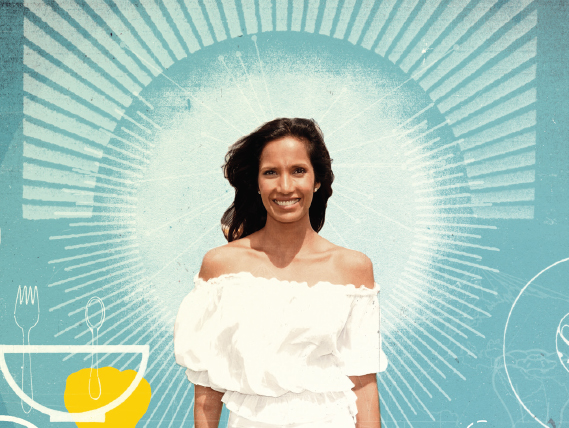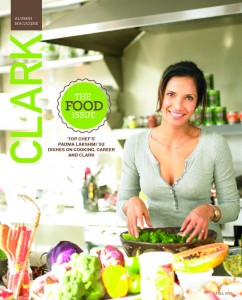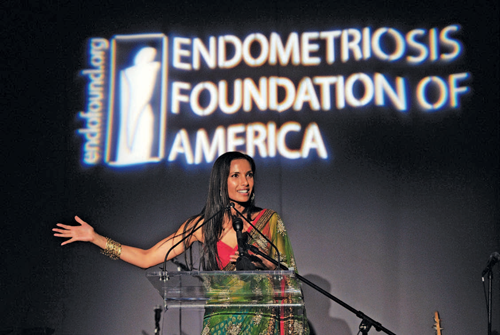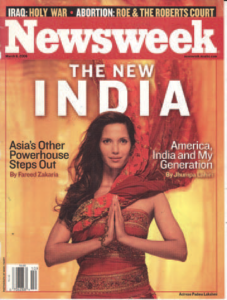Clark Magazine
Padma Power

If you try to find Padma Parvati Lakshmi in the 1992 “Pasticcio,” you’ll be lucky to spot her in a single blurry, uncaptioned photo where she stands among a large group of students holding a Clark banner.
There is no senior portrait of her.
But if you’re looking for Lakshmi anywhere else, no problem. You’ll easily find her on TV, in magazines, in the cookbook aisle, online in countless red-carpet slideshows, or dazzling the paparazzi alongside other A-list celebs at posh fundraising events. Drop her name in Google and it lists “about 3,870,000 results.” You even can watch videos of speeches she has delivered at medical conferences.

Lakshmi — cookbook author, actress, entrepreneur, designer, philanthropist, model and mom — is arguably Clark’s most famous and glamorous alum. She recently took time out during her work as host and judge on the Emmy Award-winning series “Top Chef ” to recall her days as an undergraduate and talk about her journey to and from Clark.
“I remember during freshman orientation there was this big, ominous moment when the welcoming person said, ‘Look to your left. Now look to your right. One of you won’t be here in four years.’ I think that the ‘one of you’ they were talking about was me, because in my last semester I high-tailed it out of Clark to go abroad,” she says. “I was ready to go and see the world and had pretty much done all my credits at that point.”
Lakshmi marvels that she somehow talked her way into the study-abroad program in Madrid. “I hadn’t taken any Spanish classes. I just convinced them to send me to this beginning program, the same one the other kids were going to.” Heading overseas in her last semester was an unusual move, she admits, but it dramatically changed the trajectory of her life and career. (She figures the semester abroad is probably why she had no official yearbook portrait.)
The Hollywood script-worthy story of Lakshmi’s “discovery” begins in Spain. And that’s where she came awfully close to dismissing an offer that set her on the path to fame and fortune.
After arriving in Madrid, Lakshmi was met at the airport by fellow Clarkie and friend Santiago Molina ‘91, who today is head of equity research at Spanish banking giant la Caixa. At a café one evening, Molina introduced her to his friend who was a modeling agent. He asked Lakshmi if she’d considered modeling.
“I was a bit of a snob about it and said I didn’t want to ruin my GPA in the last semester,” she laughs. But since she only had to be in school from 9 a.m. to 1 p.m., Molina finally convinced her to visit the agency one afternoon. “And that’s how I started modeling in Madrid.”
From hot plate to haute cuisine
Not long after her graduation from Clark, Lakshmi was being celebrated as the first supermodel of Indian descent, marching the fashion runways in Paris, Milan and other cities around the world.

Amid all the travel, Lakshmi practiced her love of cooking, experimenting with a wide range of global recipes and spices. She published “Easy Exotic: A Model’s Low-Fat Recipes from Around the World,” which won awards for a first cookbook. She hosted a top-rated TV cooking show based in Rome. (Italian is one of five languages she speaks. Spanish, English, Hindi, and Tamil are the others.) This feat led to her own show back in the United States, “Padma’s Passport” on The Food Network, as well as a documentary series “Planet Food,” also seen on Discovery worldwide, which brought her to the “Top Chef “ hosting spot in 2006. The Bravo network program gained a cult-like following and Lakshmi’s star grew brighter. In March of that year, she appeared resplendent in a sari on the cover of Newsweek, illustrating a feature on “The New India” and Indians in America.
In 2007, the year she appeared among People magazine’s “100 Most Beautiful People,” Lakshmi also published her second cookbook, “Tangy Tart Hot & Sweet: A World of Recipes for Every Day.” In vignettes accompanying the recipes, she lovingly traces her culinary roots from Southern India to the immigrant-infused home kitchens and restaurants she experienced with her mother in New York and Southern California. She writes: “By the time I was in college, I was trying different recipes from the international students who cooked in my dorm. When I studied abroad in Spain, the first things I learned to say in Spanish were the names of ingredients I needed to make the dishes that reminded me of home.”
From hot-plate cuisine in Dana Hall during her first year, to Maywood the next, Lakshmi savored opportunities to try out new foods. In her junior year, she lived above Wendy’s Clark Brunch (now Annie’s) on Main and Downing streets. “There was always the smell of hash browns, or bacon and eggs cooking,” she recalls, “but I didn’t really mind that. In those days, the place opened at 5:30 and closed in the afternoon. The owner was very good about being good-humored no matter what time we strolled in, even if it was after closing time.”
Big passion in the Little Theater
Lakshmi enrolled as a psychology major, but changed her mind during the second semester of her first year. “I just decided that there were enough people out there more interested in Pavlov’s dog than I was. I loved college, but thought something was missing,” she says. “I was very involved in theater in high school, so I tried out for a play with CUPS [the Clark University Players Society]. I think I did ‘Crimes of the Heart,’ by Beth Henley.” She also worked on costumes in “The Madwoman of Chaillot.”
Getting involved in theater made Lakshmi realize “that’s what was missing.” She enjoyed an introductory class in creative movement taught by Gino DiIorio, professor and playwright who is now the chair of the Visual & Performing Arts Department. “I switched my major to theater after that,” she says.

Lakshmi remembers spending many hours in the Little Theater, where she had what she describes as an apprenticeship of sorts with Catherine Quick Spingler, a former French instructor who also designed costumes for stage productions. Lakshmi also styled hair and makeup for other actors when not cast in a play. “It was a very small theater department, so it was pretty much all hands on deck wherever possible.”
As a financial aid student with merit-based scholarships, Lakshmi spent her extracurricular time in work-study positions, with Spingler, and also in a job with the administration. One summer, she worked as a teaching assistant in a “History of Science” course, she says. “I did whatever job I could because, you know, I needed the dough!”
Despite the hard work, Lakshmi says she regards her Clark days with a sense of satisfaction. She recalls being a student representative for the honorary degree committee. “I really enjoyed bringing different people to campus — whether it was Václav Havel or Madeleine Albright, who we invited to come before she was secretary of state. Those were interesting moments for me.”
She happily conjures memories of Spree Day and concerts in The Grind (formerly the Pub). “Spree Day was always fun. And I remember seeing Dave Mathews. He wasn’t as well-known as he is now, not nearly. We didn’t really know who he was. He came to play at the bar at Clark. Do they still have that bar? It was underground; very dark and dingy.”
Lakshmi reminisces about exploring different dining experiences at area establishments, naming favorite places nearby. “There was a place downtown called Tommy Guns that I really liked,” she offers. “They had waiters who would sing and dress up like they were in the 1920s. And there was an Armenian place called Ari’s Café. … I remember Coffee Kingdom with great fondness.”
Professor emeritus Michael Spingler and his wife Catherine, who each taught in the Department of Foreign Languages and Literatures, remain Lakshmi’s most enduring link to her time at Clark. “I love the Spinglers, and I became very close to both Michael and Cathy — at Clark and after Clark,” she says. “I’ve kept in touch with them over the years. I would say that Michael Spingler probably had a very good hand in helping me learn to cook. My first cookbook is dedicated to him.”
Lakshmi’s high regard for education is evident to anyone examining her life and career. Her official online biography and many media interviews mention her Clark theater arts degree. When the conversation turns to current headlines about higher education and questions about the necessity and costs of a college degree, she expresses strong opinions informed by her own experiences:
“I remember when somebody once approached me about modeling, about the time of high school, and my mother said, ‘If you’re pretty at 17, you’ll be even prettier at 21.’ She was very adamant that I go to college. You know, we couldn’t afford college. It took a lot for me to be able to get through college financially. If it wasn’t for modeling, I don’t believe I would have paid back my college loans nearly as quickly as I did.
“I have some college friends who were also on financial aid who didn’t really pay back their college loans until almost last year. And that’s not uncommon. It is a big investment, but I think it’s worthwhile. There is a way to get a lot of academic learning and knowledge of a cultural sort outside of college; college is not the only provider of that kind of intellectual thinking or academic learning, but it is the main source of it in our culture.”
College, she continues, is also valuable “because it is the only time in most of our lives where we have a level of freedom to explore who we are and who we want to be without having the responsibility of complete adulthood. Those four years are really to inform oneself. If you’re not in college and you have to right away go out and get a full-time job, you don’t go through that experience. I think college serves to get a lot of questions answered and gives us time to feel like individuals — out of our parents’ home. And, even if we live at home and go to school, there’s still an autonomy that you can have without fully having the responsibilities of being an adult.”
‘Top Chef’s’ working mom
Now, just turned 42, Lakshmi is juggling responsibilities that would be daunting to the most energetic 20-something.

A paradoxical mix of glitterati and literati — her eight-year relationship (including a three-year marriage) with renowned author Salman Rushdie was an international sensation — Lakshmi has impressed fans and even critics by proving to be much more than a pretty face. She has employed entrepreneurial savvy to build an empire of sorts. Her jewelry designs, “The Padma Collection,” are in top retail stores, along with her “Easy Exotic” line of cooking products such as teas and spice blends, teapots, and cooking tools.
She is formulating her third cookbook, as yet without a theme or title. “I don’t really know what it’s going to be until I actually finish it. I tend to do a lot of writing and a lot of cooking and then try to carve a book out of that thicket. The writing takes a lot of concentration and it’s hard to carve out time to do that in any meaningful way,” she says. “It is the most gratifying of all my jobs, I would say. But I’m thankful for all of the work that I’ve been able to do. I have a lot of downtime from ‘Top Chef ‘ because we film the show all in one go. And when I’m not working on ‘Top Chef,’ obviously, I’m doing other things, attending to my family and being a mom.
“Before ‘Top Chef,’ I was writing a lot more,” Lakshmi continues, citing earlier work as a contributing editor to Harper’s Bazaar and writing a syndicated column for The New York Times. “It’s harder to write now because I don’t do it as consistently. Writing is like any other muscle: the more you do it the better you get and the easier it is to do. But I’m lucky in that I’m able to at least experience all these different jobs in the course of any given year.”
“Top Chef,” entering its 10th season, remains Bravo’s most popular program and has inspired several spin-offs and numerous imitators. Lakshmi clearly enjoys working with the contestants, even when she has them fixed with a laser-like stare and issues the dreaded command, “Pack your knives and go.” She’s reluctant to name favorites. “Sometimes the chefs that you wind up staying in touch with or become close to aren’t even necessarily the winners,” she acknowledges. “It’s like being a teacher and every year you get a new set of third graders.”
She does mention Dale Talde, a contestant from Season 4 who opened a restaurant in Brooklyn. “I’ve been there. I’m very proud of him and it’s nice to see what he’s accomplished after the show.”
It seems remarkable that nearly six years after being profiled in a Variety feature titled, “Model Entrepreneurs: Banks, Klum and Lakshmi take beauty and brains to the bank,” all three of the story’s subjects — Lakshmi and fellow supermodels Heidi Klum and Tyra Banks — have remained in the spotlight as celebrities, successful businesswomen, fashion icons and TV personalities/ producers.
Doing well, and doing good
Amid all the glitz and business enterprise, Lakshmi devotes a good deal of time working to benefit various causes, chief of which is advancing the Endometriosis Foundation of America, which she co-founded with Dr. Tamer Seckin in 2009. Her work for this cause is where she reveals heartfelt personal motivation and her most vulnerable, yet empowered, self.

Lakshmi has been candid about her long struggle with endometriosis, an often painful condition in which cells from the lining of the uterus grow in other areas of the body. She suffered, undiagnosed, until age 36. Her crusade is to get all young women to talk openly about and demand attention to the symptoms of endometriosis, which, she says, are often misunderstood, ignored or simply brushed aside. In 2009, she delivered the keynote speech at the official launch of the new Center for Gynepathology Research at the Massachusetts Institute of Technology. She is continually engaged in raising money to educate women and physicians about the disease. Her annual Blossom Ball in New York is a high-society “must” event, and she organizes every detail, from the guest list to the “too spicy” menu to the flower arrangements.
Lakshmi also serves as a global ambassador for “Keep a Child Alive,” a charity that supplies treatment and services to children and families affected by HIV/AIDS in Africa. She is active with Habitat for Humanity and other philanthropic causes as well, including supporting the sustainable food movement.
Always, food is at the core of Lakshmi’s life and work. “I love to cook even when I’m not working,” she says. “When you travel a lot for work, it’s nice just to be home as well.” New York City is her home base, where she lives with her 2-year-old daughter, Krishna. “I wouldn’t want to live in any other city in the world. … I go back to India still, about once a year for three or four weeks to be with my family. Other than that I still love to travel. It’s not as possible now because of my young daughter, but she gets around. Her passport is much more filled than that of most adults in this country.”
In a video of a speech she made on behalf of the Endometriosis Foundation of America, Lakshmi recounts being told she would never have children, having been medically untreated or mistreated for so long. As an Indian, she says, she believes in karma, and after deciding to launch her foundation she discovered she was pregnant. “I sincerely believe that it was me being galvanized by my own selfish needs that encouraged me to help other women,” she tells the audience, “so that young women who are in their college years now can get tested and do not have to go through what I went through. [That] gave me the good karma of the universe, or God or whoever you want to say, to give me my little baby girl.”
Padma Lakshmi does indeed seem blessed by a kind of good karma that might be credited with supplying the beauty, intellect, creativity and drive that has led to her success.
A Forbes magazine headline once asked, “Where Will Padma Lakshmi Go Now?” Karma may indeed direct her path, and the journey undoubtedly will be a zesty one.


